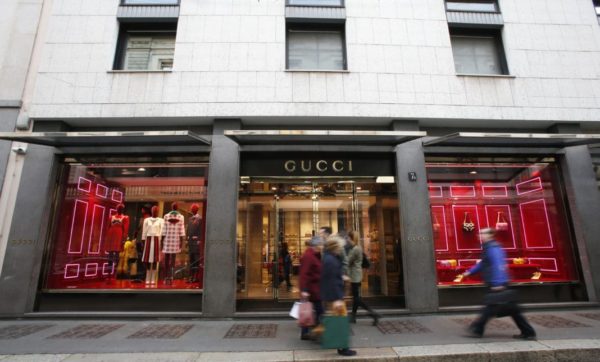
People walk in front of Gucci shop in Monte Napoleone street in Milan, Italy. Nigerian women who were trafficked to Italy to work as prostitutes have found new work in a handbag and dressmaking shop that recently received some fabulous raw materials: 4,000 meters (4,374 yards) of fabric leftovers from Gucci. (AP Photo/Antonio Calanni, file)
ROME (AP) — Nigerian women who were trafficked to Italy to work as prostitutes have found work in a handbag and dressmaking shop that recently received some top-notch raw materials: 4,000 meters (4,374 yards) of leftover fabric from Gucci.
The initiative was announced Wednesday in Rome, complete with a fashion show by the Nigerian dressmakers and a group of Italian design students who helped teach them to sketch and sew the designs, which mix Gucci silks, satins and cotton with bright African prints.
Sister Rita Giaretta, who runs a home for rescued migrants in the southern city of Caserta, said the aim of the project was to give the women dignified work so they aren’t reliant on handouts.
“Giving them their dignity means putting them back on their feet and believing in themselves and not seeing themselves only as in a situation of need,” Giaretta said.
The New Hope tailoring cooperative, which has a storefront shop in Caserta, was born in 2004 as a project affiliated with Giaretta’s residence and until now made mostly bags and accessories.
Its workers branched out into clothing after attending in training workshops put on by design students from the local high school. The Gucci bolts of fabric were donated as part of the fashion house’s philanthropic environmental initiative, Equilibrium, which seeks to distribute leftover leather and fabrics to organizations that work with marginalized groups.
“When I saw the fabric I was amazed,” said Josephine Phillips, a 35-year-old Nigerian woman who works in the New Hope workshop and modeled a headscarf and reversible handbag Wednesday. “We weren’t expecting such beautiful things — satins, materials I didn’t know.”
Between 10,000 and 30,000 Nigerian women are believed to be currently working as prostitutes in Italy, forced into the sex trade to pay off debts to human smugglers who arranged for them to get here.
The Italian government has tripled its funding to help them get off the streets and into safe houses, but advocates say there aren’t enough beds to go around.


